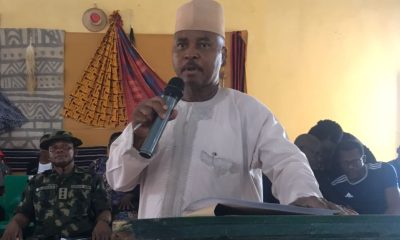Agriculture
FG to Establish Three New Cassava Processing Plants in Imo, Targets 1000 Women

By Joseph Amah, Abuja
The federal government has approved the establishment of three new cassava processing plants as well as the rehabilitation of Songhai Farm in Imo State. Executive Secretary of the National Agricultural Land Development Authority (NALDA), Prince Paul Ikonne disclosed this at the inauguration of the Achara-Ubo Emekuku Integrated Farm Estate in Imo State, a project developed by NALDA.
The NALDA boss also informed that President Muhammadu Buhari has given the nod for the empowerment of 1000 Imo women in cassava production and another 5000 men to benefit from NALDA’s project and Central Bank of Nigeria’s (CBN) N3 million resolving loan to the beneficiaries to sustain their farms.The Achara-Ubo farm which is located in Owerri North local government area, sits on 35 hectares of arable land with six poultry houses with 18 pens that contain about 10,000 birds, three goat houses with 196 goats and three piggeries containing 108 pigs. It also has three solar powered boreholes, access roads and drainage and solar powered street lights on the farm. Speaking to newsmen while inaugurating the estate, Prince Ikonne said the project was in line with President Muhammadu Buhari’s administration vision to create jobs for the youth and women to ensure food security. He added that the farm will give 600 direct employment to farmers in poultry, piggery and goatry while 200 additional farmers will be engaged in the processing, packaging and export. “Achara-Ubo farm is expected to take in 600 farmers, the processing and packaging section will soon start, which will take in additional 200 people and the crop section will soon start because we have provided the tractor,” Ikonne said. “This farm will be a centre that will train farmers within and outside Imo State and the 200 beneficiaries have been trained and empower with the knowledge and they are the first set of people to benefit from this project and as they pass out in the next six months, they will sort their own farming activities and another set of people will come in.” He said activation of the farm is one of the ways to demonstrate the passion of President Muhammadu Buhari in terms of agriculture.
He added, “This farm was abandoned for 30 solid years and NALDA took over and development it, the farm is purely the desire of President Muhammadu Buhari to reactivate and reform the farm estate across the country because the president believes that going back to the land is the only way our economy can be sustained and our youth will be gainfully employed to achieve food security and we are very hopeful that the farm will be very productive and that the farmers will begin to earn income. “The direct engagement is about 600 farmers into poultry, piggery and goatry and an additional 200 farmers into the processing, packaging and export because we have processing plant here that is coming up.” He maintained that in the first year of the entire project, approximately 1,000 farmers will be engaged in the area of animal husbandry.
On capacity building, the executive secretary said, “The good thing is that this place will turn as a training ground for the youths in Imo State as they pass through one year here and they will be established and we are partnering with the Central Bank of Nigeria to give them support, a grant that they will use to establish their own farms, so for the first one year they will be here, they will get the technical knowledge, they will know how to rear their own animals and then the central bank grant comes in to support their projects. The grant is across the country and we are looking at N3 million per farmer and it is a revolving loan as they are productive, So with that you will see that the number of the unemployed will reduce in the state and across the country.”
To ensure its sustainability, Prince Ikonne noted that the project will be handed over to the community to take its ownership for proper management. He said, “so I charged the beneficiaries to take the project seriously as you passed out, you will get this soft support facility from the Central Bank of Nigeria that will help you start your own project, the enabling environment given to NALDA to reactivate this farm is encouraging, so farmers, women and youth it is time for us go to back to farm because that is only way we stay safe in the near future, create jobs and provide food security”. Meanwhile, some of the beneficiaries of the project who spoke to journalists at the farm, applauded the federal government for resuscitating the moribund farm estate. They said the training has help them gain first hand knowledge in animal husbandry. One of the beneficiaries, Agba Kingsley, head of goatry department who left block industry to join the farm said he found farming more lucrative.
While calling on young Nigerians to embrace farming, Kingsley said, “Government is doing good by establishing the farm and the business is profitable, so if Nigerian youth have interest in farming, the outcome will be profitable for them, they should join us”. Another beneficiary at the poultry section, Nnadi Chioma Sylvia said the business has helped her employ an additional 10 people . Sylvia said, “The farm has helped my family and being part of this is a great opportunity and when people see me now, its obvious they will know that I am benefiting and I have engaged 10 people. ” Similarly, NALDA’s project coordinator, Imo State, Emeka Ugwunali expressed hope that the project will help the host community and beneficiaries improve their well-being. Delivering his speech during the launching, Imo State governor, Senator Hope Uzodinma said the project will be sustained through local security and several trainings that will put lager number of beneficiaries on the track of sustainable animal husbandry. He said, The partnership with NALDA is to enable the federal government to bring more equipment to enable off takers to take our products to the appropriate market and thereby making us earn more income and increase our internally generated revenue. The governor said the state government in collaboration with the federal government will invest N18 billion for the rival of the similar moribund to Songhai Farm.
Agriculture
Tiv Monarchs Give Herders Ten Days Ultimatum To Vacate Tiv Kingdom

By David Torough, Abuja
The Tiv Area Traditional Council during its emergency meeting held yesterday in the palace of the Tor Tiv in Gboko requested the Governor Hyacinth Alia led administration to create an enabling environment to allow herders’ peaceful exit of farmlands in Tiv Kingdom to facilitate resumption of farming activities.
Consequently, the Council directs political and traditional rulers in each local government area of Tiv Kingdom to peacefully engage the herders to ensure their exit from the local government areas to allow farming resumes.
The Council which was chaired by the Tor Tiv himself, HRM Prof James Ortese Iorzua Ayatse CFR equally appealed to all herders in Tiv Kingdom in Benue State to vacate all Tiv lands before the end of May 2025 to allow farmers return and cultivate their farms in order to avoid the looming hunger in Nigeria.
According to a Communique signed by the Secretary of the Council Mr Shinyi Tyozua which deliberated particularly on the security situation in Tiv Kingdom the Council enumerated the communities worst affected to include those in Kwande, Katsina Ala, Logo, Ukum, Guma, Makurdi, Gwer West Gwer East and Buruku Local Government Areas.
The Council lamented that farming activities in the kingdom have ceased due to the occupation of farmlands by herders for grazing and attacks and killings of farmers who fled stressing that if the situation continues it will ultimately result to hunger in Tiv Kingdom and Nigeria as a whole.
Agriculture
Ondo Govt. Destroys 200kg Seized Cocoa Adulterants

The Ondo State Government, on Thursday, destroyed 200kg adulterants used for adulteration of cocoa beans, seized from a merchant in Ondo West Local Government Area of the state.
Mr Segun Odusanya, Permanent Secretary in the Ministry of Agriculture and Forestry (Forestry and produce sub section), supervised the destruction of the 200kg bags of seized adulterants.
Odusanya explained that the destruction was part of government efforts to ensure that the state maintained quality cocoa production in the country.
“Mr governor, Lucky Aiyedatiwa, has reiterated the commitment to ensure the state remains the highest producing state with good cocoa quality
“Anyone caught engaging in illegal activities will be prosecuted accordingly.
“Moreover, this action was embarked on to warn cocoa merchants, who intend to engage in illegal activities, to rethink before getting into it.
“We are going to seal any store caught in such illegal activities, the products will be burnt while the merchant will be prosecuted according to the laws of the land.
“If we are saying we are the highest cocoa producing state and we continue to encounter this scenario, it will give us a bad publicity.
“The bad publicity will be in the country and extend to the international market, and we don’t want that,” he said.
The permanent secretary, therefore, commended Aiyedatiwa for graciously approving the recruitment of 60 new staff to checkmate the activities of cocoa merchants in the state.
“Mr governor has supported us, he has said we should recruit more people to guide against any adulteration and ensure we have a good quality cocoa beans.
“I must commended our task force committee for ensuring that the state holds its position in the country and the international market,” he said.
Earlier, Mr Tunji Akinnadeju, a Director of Produce (DP3) in the Grading and Allied Department of the ministry, said the adulterants were intercepted at Ondo West Local Government Area of the state.
Akinnadeju said that the owner of the adulterants took to his heels at the time of arrest.
“As we all know that cocoa is being sold in weight and after adding all these things, it will be sold at high prices, which is not good enough.
“So, doing that will bring a lot of damage to the image of the state and the country at large in the international market,” he said.
Also, Mr Sunday Adegbola, a Director of Produce Licensing in the ministry, said the merchants’ actions could affect people during consumption of the cocoa products, if care was not taken.
Adegbola, who pledged that the ministry would not rest until the state was free from adulterated cocoa beans, said the nefarious action could be attributed to the price tag at the international market.
“It is the price at the international market and the price is better for the farmers, not for the people who use adulterants.
“With this action, many people will drink cocoa as a chocolate powder and other materials from cocoa beans which has been adulterated.
“The consumption of these chemical products will also affect humans,” he said. (NAN)
Agriculture
NNPC Foundation Empowers Vulnerable Farmers in Oyo, Osun

No fewer than 500 farmers on Tuesday benefited from the NNPC Foundation agricultural training initiative for vulnerable farmers in Osun and Oyo States.
The training, marking the flag-off in the South-West zone of Nigeria, was held at the Ilora Baptist Grammar School, Ilora, Oyo State.
The foundation manages the Corporate Social Responsibility (CSR) initiatives of NNPC Limited, focusing on education, health, environment and energy access to communities nationwide.
The Managing Director of the foundation, Mrs Emmanuella Arukwe, said the initiative demonstrated the commitment to food security and economic empowerment for Nigerian farmers.
Arukwe, who was represented by Dr Bala David, the foundation’s Executive Director, Programme Development, said the project aimed to build resilience, boost productivity and promote sustainable agriculture.
“We are training 6,000 farmers across six zones in climate-smart practices, modern techniques, quality inputs, and market access,” she said.
She, therefore, urged farmers to participate actively and embrace the opportunity to help secure Nigeria’s food and economic future.
Mr Olasunkanmi Olaleye, Oyo State Commissioner for Agriculture and Rural Development, commended NNPC Foundation for the training and empowerment programme.
Olaleye, who was represented by Mr Olusegun Ezekiel, the ministry’s Director of Regulation and Enforcement, said empowering vulnerable farmers was crucial in addressing national food security challenges.
He added that the initiative aligned with Oyo State’s agricultural transformation agenda of Gov. Seyi Makinde.
“We remain committed to supporting initiatives that uplift farmers and improve productivity and livelihoods,” Olaleye said.
He encouraged participants to make the most of the training opportunity to improve their practices.
He also called for future collaboration between the foundation and the ministry to achieve greater impact.
The training consultant, Prof. Daniel Ozok, described vulnerable farmers as smallholders with an under-five-hectare farm size, mainly made up of women, youth, and the elderly.
“These farmers are most affected by climate shocks, hence the need for focused training,” Ozok said.
According to him, training equips them with modern techniques and strategies for improved productivity and market access.
Some of the participants expressed gratitude to NNPC Foundation and promised to apply the knowledge gained from the training.
NAN reports that a medical screening exercise was organised by the foundation for participants on the sidelines of the training.
Training initiative would later be held for farmers in Ekiti and Ondo States on a date different from that of Ogun and Lagos States. (NAN)





























